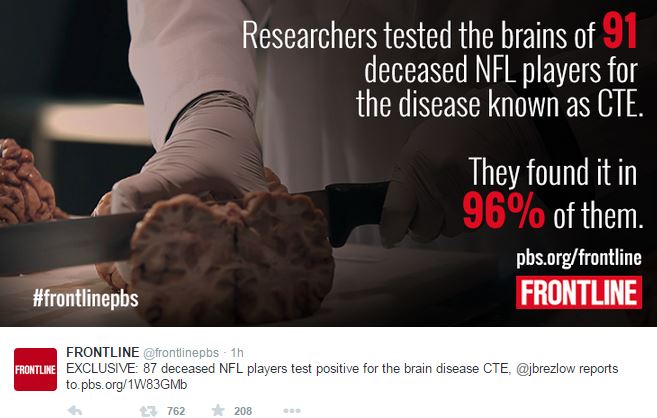Ad Disclosure
Report: 96% of Former NFL Players Brains Tested by Researchers Showed Signs of CTE
By Jim Adair
Published:

Just in time for some great publicity for the Will Smith film Concussion, and terrible publicity for the NFL, Frontline has announced that 87 deceased players’ brains tested by researchers (96%) showed signs of CTE.
It’s hardly unsurprising, but the high percentage of cases is still shocking. And as the Frontline report says, it’s not just those 87:
“Researchers with the Department of Veterans Affairs and Boston University have now identified the degenerative disease known as chronic traumatic encephalopathy, or CTE, in 96 percent of NFL players that they’ve examined and in 79 percent of all football players. The disease is widely believed to stem from repetitive trauma to the head, and can lead to conditions such as memory loss, depression and dementia.
In total, the lab has found CTE in the brain tissue in 131 out of 165 individuals who, before their deaths, played football either professionally, semi-professionally, in college or in high school.
Forty percent of those who tested positive were the offensive and defensive linemen who come into contact with one another on every play of a game, according to numbers shared by the brain bank with FRONTLINE. That finding supports past research suggesting that it’s the repeat, more minor head trauma that occurs regularly in football that may pose the greatest risk to players, as opposed to just the sometimes violent collisions that cause concussions.”
PBS goes on to report that there are some things to note. Firstly, “testing for the disease can be an imperfect process,” and since the disease can only be identified to 100% certainty posthumously, and the brain bank mainly has the brains of players who thought – or whose families thought – they suffered from CTE, the numbers could be skewed. Still, Dr. Ann McKee, the facility’s director and chief of neuropathology at the VA Boston Healthcare System, said the numbers are “remarkably consistent” with prior research. “This is a very real disease,” McKee said. “We have had no problem identifying it in hundreds of players.”
In response to the report, an NFL spokesperson said:
“We are dedicated to making football safer and continue to take steps to protect players, including rule changes, advanced sideline technology, and expanded medical resources. We continue to make significant investments in independent research through our gifts to Boston University, the [National Institutes of Health] and other efforts to accelerate the science and understanding of these issues.”
There’s more from Frontline here, but this is just the newest in a series of hurdles that Roger Goodell will likely stumble over.
When he's not writing about sports here or ranting about them on Twitter, Jim is probably watching X-Files on Netflix or drinking a beer somewhere. Jim has nothing against hockey, it's just not his style. He once met Duce Staley at a Sixers game.